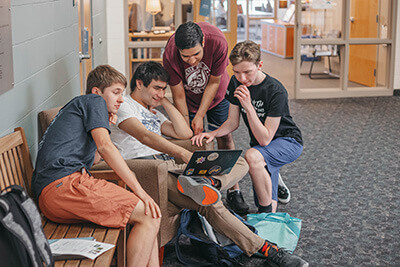May 23, 2024
 from Dr. Bill Hudson, head of school
from Dr. Bill Hudson, head of school
I recently went through some boxes in my mother’s house and came across a collection of my elementary school report cards. Year after year, very similar comments went something like this: “Bill would do much better if he learned to raise his hand and not blurt out answers during class discussions.” “Bill needs to be better about handing in his assignments.” “Bill scored highly on tests, but his lower grades reflect the absence of homework.” And “If Bill would only try harder, his grades would be higher.” I talked too much, didn’t raise my hand, and didn’t turn in my homework, but I scored very high on tests. Nonetheless, I felt like a failure, which only compounded the problem.
Many years later, I ran into my fifth-grade teacher, who was delighted to know I had earned a doctorate and was experiencing success in my career. “I always knew you’d do well. You had the highest IQ in the class.” I was stunned and wondered what my academic career would be like if we knew then what we know now about ADHD.
While ADHD affects how we learn, there is no correlation with intelligence. It is similar for learning differences such as dyslexia, dysgraphia, and dyscalculia. Neurodiversity is used more frequently to promote the idea that conditions like autism, ADHD, dyslexia, and other neurodevelopmental conditions are natural variations of the human brain rather than disorders to be cured. People with learning differences may have difficulty acquiring or demonstrating knowledge in traditional ways, but that doesn’t mean they cannot succeed in rigorous coursework or at schools like MPA.
The percentage of students with learning differences has consistently been on the rise in schools across the country. In a recent survey of independent heads of schools from across the United States, 85% said that supporting the learning needs of neurodiverse students is a priority for them. This reflects a 52% increase in just one year, from 2023 to 2024.
The first priority of 2024ward, MPA’s strategic plan, charges us with preparing students to live, learn, and thrive in today’s complex global society. The first goal of that priority is to “Create customized pathways of learning for students through curricular innovation and leveraging advances in educational technology.” To create these personalized pathways, we must ensure we know every single student well—academically, socially, emotionally, and mentally. Academically, we must tailor instruction to the strengths and needs of each student. Teaching the whole child is the MPA way and has been since the school was founded.
You may have read that, through the generosity of our community, we are launching a new initiative, the Center for Inclusive Teaching & Learning. Not a physical space, the Center reflects a deepening of our mission by creating a more inclusive, engaging, and effective learning environment by addressing all students’ diverse needs and helping all students achieve their full potential.
As we move forward, our mission will not change, nor will our admission criteria, messaging, or target market. We continue to be committed to our mission as a rigorous college prep school for students who love to learn. Creating personalized pathways of learning does not mean sacrificing rigor, content, or high standards. Rigor is not a dichotomy and an either/or choice. It’s not a choice to serve students who have needs and those who don’t. It’s a recognition that all students have needs, and there are a variety of needs along the learning spectrum.
Specifically, the Center for Inclusive Teaching & Learning will provide an instructional coach to support teachers in meeting all students’ needs, professional development for all teachers at all divisions and grade levels for all types of learners, new classroom furniture and design that promotes effective learning, teaching, and collaboration, additional tools and services for students, caregiver education and resources, and so much more.
The Center builds on our existing mission to teach the whole child. All students benefit from customized, personal pathways of learning. For students needing greater challenge, it may mean that they can move through the curriculum faster or benefit from enriched content. It provides a measure of choice and autonomy for students to express their understanding in sophisticated and innovative ways based on their unique learning needs.
Providing a flexible, enriched, and stimulating learning environment that meets their intellectual needs and supports their overall development ensures that all students remain engaged, challenged, and motivated, fostering both academic and personal growth. The Center for Inclusive Teaching & Learning embodies what MPA has always done best—provide individualized, whole-child educational experiences for all students—and empowers and equips us to do it even better.
If you have questions about the Center for Inclusive Teaching & Learning, I encourage you to reach out to me. If you would like to support the work, please contact giving@moundsparkacademy.org.